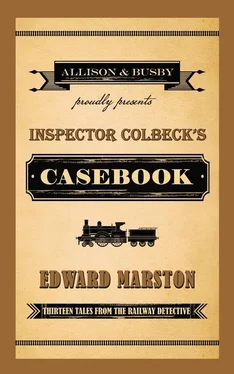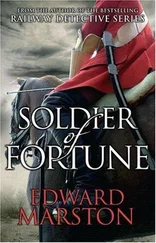Edward Marston - Inspector Colbeck's Casebook
Здесь есть возможность читать онлайн «Edward Marston - Inspector Colbeck's Casebook» весь текст электронной книги совершенно бесплатно (целиком полную версию без сокращений). В некоторых случаях можно слушать аудио, скачать через торрент в формате fb2 и присутствует краткое содержание. Год выпуска: 2014, ISBN: 2014, Издательство: Allison & Busby, Жанр: Исторический детектив, на английском языке. Описание произведения, (предисловие) а так же отзывы посетителей доступны на портале библиотеки ЛибКат.
- Название:Inspector Colbeck's Casebook
- Автор:
- Издательство:Allison & Busby
- Жанр:
- Год:2014
- ISBN:9780749014742
- Рейтинг книги:4 / 5. Голосов: 1
-
Избранное:Добавить в избранное
- Отзывы:
-
Ваша оценка:
- 80
- 1
- 2
- 3
- 4
- 5
Inspector Colbeck's Casebook: краткое содержание, описание и аннотация
Предлагаем к чтению аннотацию, описание, краткое содержание или предисловие (зависит от того, что написал сам автор книги «Inspector Colbeck's Casebook»). Если вы не нашли необходимую информацию о книге — напишите в комментариях, мы постараемся отыскать её.
Inspector Colbeck's Casebook — читать онлайн бесплатно полную книгу (весь текст) целиком
Ниже представлен текст книги, разбитый по страницам. Система сохранения места последней прочитанной страницы, позволяет с удобством читать онлайн бесплатно книгу «Inspector Colbeck's Casebook», без необходимости каждый раз заново искать на чём Вы остановились. Поставьте закладку, и сможете в любой момент перейти на страницу, на которой закончили чтение.
Интервал:
Закладка:
The driver stiffened with indignation. ‘You surely don’t think that we had anything to do with it?’
‘No,’ said Colbeck, ‘I don’t. But I want to be absolutely sure.’
‘You’ve no right to search me,’ declared Neale, angrily.
‘That’s why I’m asking you to turn out your pockets yourself.’ He pointed to the burly Metropolitan policeman who stood in the doorway. ‘If you find that too much of an imposition, Mr Neale, I could ask Constable Reynolds to help you.’
Neale was on his feet. ‘Keep him away from me!’
‘Then do as I request. Put your belongings on that table.’
‘Come on, Alf,’ counselled Barrett, resignedly. ‘Do as the inspector says. That goes for you, too, George.’
‘I’m no thief,’ protested Hawley.
Nevertheless, he emptied his pockets and put his few possessions on the table. Barrett followed suit and, after some cajoling, so did Neale. They even submitted to being patted down by Constable Reynolds as he searched for items concealed about their persons. None were found.
‘Thank you, gentlemen,’ said Colbeck. ‘I think that it’s safe to say that you’ve been eliminated as possible suspects.’
‘Does that mean we’re released, sir?’ said Barrett.
‘Not exactly.’
‘But we have to deliver the train to Swindon.’
‘I need to inspect it first, Mr Barrett. After all, it’s the scene of the crime. I want all three of you there with me, please.’
‘Why?’ asked Hawley, collecting his meagre possessions.
‘Because I want you to show me exactly where you were at the time when — in all probability — Mr Proudfoot was murdered.’
When the crime had been discovered the previous evening, the train had been backed into a siding. It comprised a locomotive, a six-wheeled tender, second-class carriage, first-class carriage and brake van. The train was guarded by two uniformed railway policemen, who stood to attention when they saw the inspector coming. As they approached, Robert Colbeck ran an admiring eye over the steam engine, glinting in the morning sunshine. It had a tall chimney, a sleek, compact boiler and a large domed firebox. Its two driving wheels were 84 inches in diameter and its name — Castor — was etched in large brass letters.
‘What’s wrong with her, Mr Barrett?’ he enquired.
‘Old age,’ said Barrett, sadly. ‘ Castor ’s over ten years old now and she’s starting to look it. There’s a problem with her valve gear that needs to be put right and her boiler piping has to be overhauled. She’s part of the Firefly class, designed by Mr Gooch.’
‘Yes,’ added Neale, proudly. ‘ Castor hauled the first train between London and Bristol when the line was opened in 1841. The fireman that day was a certain Jim Barrett.’
Barrett smiled fondly. ‘It was an honour.’
‘Why did you have a second-class carriage in tow?’ asked Colbeck.
‘Due for repair at Swindon, sir,’ said Barrett. ‘It was damaged in a collision. It was Mr Proudfoot who had the first-class carriage attached and, of course, we needed a brake van.’
‘Let’s start there.’
Reaching the van, Colbeck took hold of the iron handrail and pulled himself up. The driver and fireman remained on the ground but the guard followed him. The brake van was little more than a wooden hut on wheels. Colbeck noted that few concessions had been made to comfort. On a stormy day, wind and rain could blow in through the open windows. He glanced at Hawley.
‘Where were you when the train was in transit?’
‘Sitting in that corner,’ said the guard, pointing to the bench that ran along the rear of the van. ‘Never moved from there, Inspector.’
‘I think I can see why.’ Colbeck bent down to retrieve a large stone jar from under the bench. He sniffed it. ‘Beer,’ he announced. ‘Do you always drink on duty, Mr Hawley?’
‘No, no, sir. I hardly ever touch it.’
‘Then why have you got a gallon jar of the stuff on board?’
‘It must have been left there by someone else,’ said Hawley.
But they both knew that he was lying.
After fixing him with a sceptical glare, Colbeck jumped down to the track and moved along to the first-class carriage that was coupled to the brake van. He hauled himself up to examine the scene of the crime. The carriage comprised three compartments, each capable of accommodating eight passengers. The seats were upholstered and great care had been taken with the interior decoration, but all that Colbeck was interested in was the blood on the floor of the central compartment. It told him the exact place where Matthew Proudfoot had been murdered.
Colbeck stayed in there a long time, trying to envisage how the killer had struck the fatal blow, and how he had got in and out of the carriage. When he eventually dropped down to the ground again, his curiosity shifted to the second-class carriage.
‘No point in going in there,’ said Barrett. ‘Doors are locked.’
‘Were they locked throughout the journey?’ asked Colbeck.
‘Yes, Inspector.’
‘Who has the key?’
‘I do,’ said Hawley.
‘I’d like to borrow it.’
Taking the key from the guard, Colbeck clambered up and unlocked the doors of the second-class carriage. Going into each compartment in turn, he searched them for signs of recent occupation but found nothing beyond a newspaper that was two days old. Colbeck put his head through the window to look back at the first-class carriage. Those below beside the track were amazed when Colbeck, having taken off his top hat, suddenly emerged through the window and made his way around the back of the carriage before flinging himself across the gap to grab the handles on the adjacent first-class carriage.
Hawley snorted. ‘You’d never do that when the train was going fast,’ he observed, grimly. ‘Not unless you was feeling suicidal.’
‘That reminds me, George,’ said Barrett, ‘you did check that second class was empty before we left Paddington, didn’t you?’
‘Yes, Jim.’ A long pause. ‘I think so, anyway.’
‘Someone could have been hiding in there.’
‘I’d have seen him.’
‘That depends on how much drink you’d had beforehand,’ said Colbeck, swinging back athletically to the second-class carriage to retrieve his hat. ‘No wonder you heard no sounds of a struggle when the train was in motion, Mr Hawley. I suspect that you may have been fast asleep.’
‘I never sleeps on duty,’ denied the guard, hotly. ‘It ain’t allowed.’
‘Nor is drinking a gallon of beer.’
Hawley bit back a reply and turned away, shamefaced.
It only remained for Colbeck to look at the locomotive and tender. James Barrett was an informative guide, standing on the footplate with the inspector and explaining how everything worked. His deep love of Castor was obvious. She had been one of the finest steam locomotives that he had ever driven. Alfred Neale waited until the two men descended from the footplate before he turned detective.
‘That’s how it must have happened,’ he said, brow furrowed in thought. ‘The villain was hiding in second class when we set off. Some time during the journey, he climbed into Mr Proudfoot’s carriage and stabbed him. It’s the only explanation, Inspector.’
‘You may well be right, Mr Neale,’ said Colbeck, pretending to agree with him, ‘though it does raise the question of how the killer knew that Matthew Proudfoot would be travelling on what is, after all, an unscheduled train.’
‘He must have followed his victim to Paddington.’
‘Possibly.’
‘Then slipped into the carriage when nobody was looking.’
‘He weren’t there when I checked,’ said Hawley, officiously. ‘And I’m sure that I did. When there’s no conductor on board, it’s my job.’
Читать дальшеИнтервал:
Закладка:
Похожие книги на «Inspector Colbeck's Casebook»
Представляем Вашему вниманию похожие книги на «Inspector Colbeck's Casebook» списком для выбора. Мы отобрали схожую по названию и смыслу литературу в надежде предоставить читателям больше вариантов отыскать новые, интересные, ещё непрочитанные произведения.
Обсуждение, отзывы о книге «Inspector Colbeck's Casebook» и просто собственные мнения читателей. Оставьте ваши комментарии, напишите, что Вы думаете о произведении, его смысле или главных героях. Укажите что конкретно понравилось, а что нет, и почему Вы так считаете.












